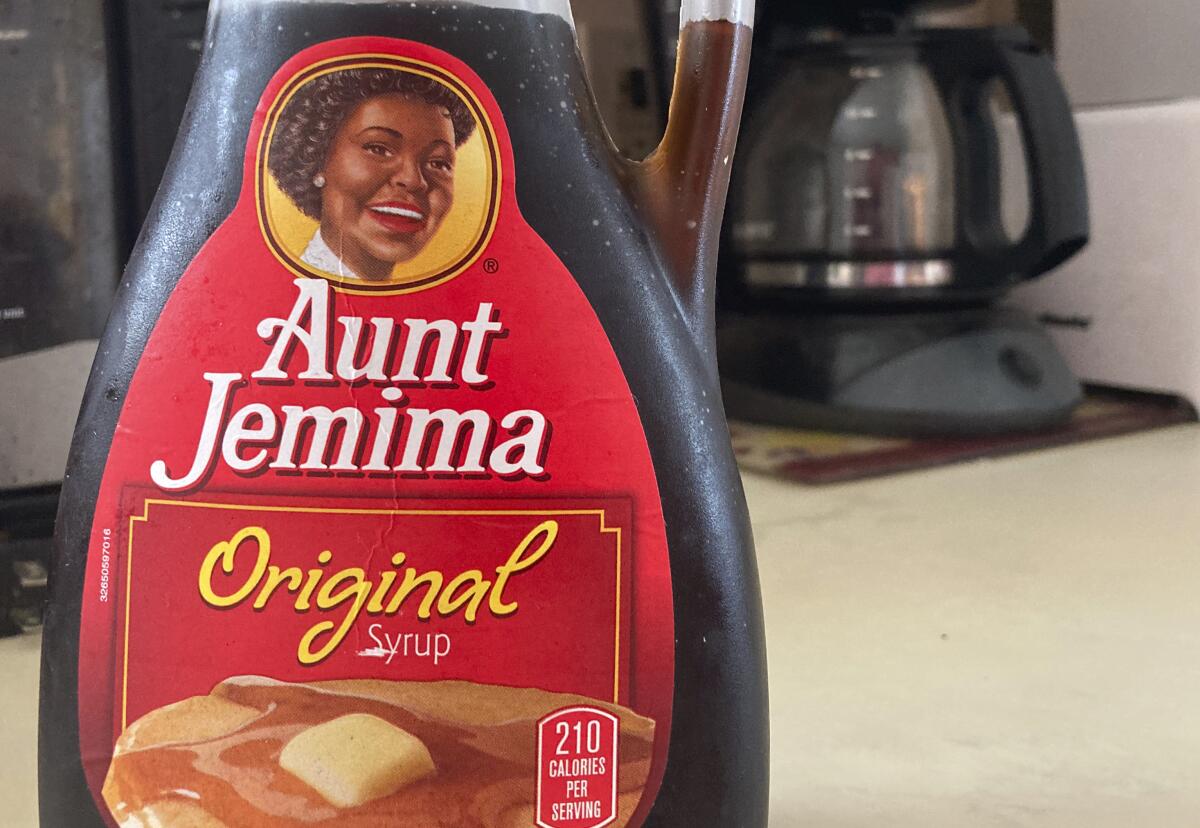Column: The Aunt Jemima brand, rooted in slavery, was in fact ‘selling whiteness’

Aunt Jemima, the long-standing brand that finally was put to rest this week, has slavery in its corporate DNA.
Nancy Green, who portrayed Aunt Jemima when the character was introduced at the World’s Columbian Exposition in Chicago in 1893, was born into enslavement six decades earlier, on a plantation in Montgomery County, Ky.
By all accounts, Green’s friendly personality made her a perfect corporate mascot, launching the Aunt Jemima name and commencing more than a century of dubious marketing. She was offered a lifetime contract to continue appearing as the character, the first of numerous Black women to play the part.
Aunt Jemima, along with Uncle Ben, who it was announced this week will also be getting the heave-ho, were not responsible for creating stereotypes. Bigotry isn’t new.
But the indisputably racist brands, and their bewildering longevity, speak to the power of marketing in reinforcing offensive stereotypes.
Simply put, if corporate America hadn’t given its full backing to creating and promoting these images as sales tools, making them both culturally legitimate and highly profitable, it’s debatable whether the country’s racial divisions would have run so deep for so long.
“There’s very strong support for that premise,” said Jerome Williams, a business professor at Rutgers University. “Corporate America perpetuated this situation.”
Judy Davis, a marketing professor at Eastern Michigan University, was even more emphatic.
“Advertising and marketing play an important role in selling whiteness,” she told me. “They have played a role in perpetuating an image that whites are superior.”
Williams related how, when he was a kid, his mom would serve Aunt Jemima pancakes or Uncle Ben’s rice, and the stereotypical branding never registered as overtly racist.
“It was just part of the background noise,” he said. “I remember watching ‘Amos and Andy’ on television and laughing along with the show.”
In hindsight, he realizes how much cultural damage was being done.
“They were very abhorrent images,” Williams said. “But like many African Americans, I just accepted this as the way the world was.”
That’s now changing, hopefully forever, as America and other nations shine a harsh spotlight on racial mistreatment, inequality and insensitivity following the death of George Floyd and amid a resurgence of the Black Lives Matter movement.
Quaker Oats said Wednesday that it’s retiring Aunt Jemima after more than 130 years of pitching the brand.
“As we work to make progress toward racial equality through several initiatives, we also must take a hard look at our portfolio of brands and ensure they reflect our values and meet our consumers’ expectations,” the Pepsi-owned company said in a statement.
Mars, owner of the Uncle Ben’s brand, quickly followed suit, declaring that the time has come to change the product’s “brand identity.”
“Now is the right time to evolve the Uncle Ben’s brand, including its visual brand identity, which we will do,” the company said. “We don’t yet know what the exact changes and timing will be, but we are evaluating all possibilities.”
These are laudable moves. But it’s hard not to wonder if they’re less an indication of corporate enlightenment and more an awareness that there’s no longer money to be made perpetuating archaic and ugly stereotypes.
“When it starts affecting corporate profits, that’s when it starts having an impact,” Williams said of criticism from consumers.
The Aunt Jemima brand has long reflected the values of a less-woke time. Case in point, a magazine ad from 1938 that depicted the white Jones family lamenting the sorry state of Mom’s pancakes.
And there’s Aunt Jemima, in full “Mammy” regalia, standing in the window declaring, “Dey sure needs me in dis house!”
Marketing that way may not make people prejudiced. But it lends a corporate seal of approval to such thinking.
Branding is incredibly powerful. It can teach the world to sing and enjoy a bottle of Coke. And it can promote a smug sense of white superiority.
“Once something is seen as normative, it’s typically not questioned and taken for granted,” said Sonya Grier, a marketing professor at American University. “Like fish in water. And this would allow such stereotypes to be perpetuated consciously or unconsciously in society.”
Seeing Aunt Jemima on a box of pancake mix, she said, drives home the idea that a Black woman belongs in the kitchen as a servant or caretaker.
“The lack of discussion, especially cross-race discussion of these issues traditionally, doesn’t allow for the stereotypes to be challenged on a personal, individual level,” Grier said.
It goes even deeper than that.
“While brands such as Aunt Jemima and Uncle Ben can’t solely be blamed for systemic racism, by using these stereotypical icons to represent their brands they are giving credence to such stereotypes on a global platform,” said Monique Bell, an associate professor of marketing at Fresno State.
“Black people, and other underrepresented groups, already face implicit biases, and these representations only encourage prejudice and further dehumanization,” she said.
Recently, it has felt like every company under the sun has wanted to demonstrate its commitment to racial harmony and diversity.
Some of these declarations are undoubtedly sincere and aim to promote positive change. Others may be little more than me-too pandering.
“I’m a little skeptical,” said Kevin Thomas, an assistant professor of multicultural branding and strategic communication at Marquette University. “I believe it’s more of a calculation at this point on the part of marketers.”
We’ll see.
“If your company is committed to change, it can’t just be about changing the symbolism,” said Davis at Eastern Michigan University. “Dropping certain names and imagery is a start, but there’s a lot more companies can do.”
It could take generations, in fact, for the influence of decades of racially questionable marketing to be undone.
Davis said that when she first heard the news about Aunt Jemima, she felt gratified. Then she made herself some pancakes.
They weren’t Aunt Jemima, but the connection was made.
Brands are mighty things. And they must not be tolerated when they do wrong.
More to Read
Inside the business of entertainment
The Wide Shot brings you news, analysis and insights on everything from streaming wars to production — and what it all means for the future.
You may occasionally receive promotional content from the Los Angeles Times.











